
Sweet Little Things
George Guidoni
Design & Innovation Food Safety Sustainability Film Plastic Les Aliments Jardi Inc. (Jardi Foods) MB Capital TC Transcontinental PackagingA sustainable flexible packaging solution enables Quebec snack-food distributor to tap into promising new growth opportunities
For Maxime Busseau, feeling like a kid in a candy store comes naturally in his role as general manager of Les Aliments Jardi Inc. (Jardi Foods) in Sherbrooke, Que.
Founded in 1987, the former mom-and-pop candy shop and importer of dried fruit, nuts, chips and other popular snacking treats has enjoyed a remarkably rapid rise up the industry ranks since Busseau joined the company in 2015 as part of its acquisition by Quebec-based
private equity group MB Capital.
With more than $20 million invested in about a dozen independent corporations operating in different business segments across North America, MB Capital has carried out a number of capital-intensive projects to swiftly turn Jardi Foods into a modern and efficient food enterprise supplying the Quebec and eastern Canada retail markets with a remarkably diverse selection of bulk dry foods.
Ranging from basic mainstays candy sweets like mints, gummies and chocolates to a growing variety of dried fruits, nuts and seeds, along with an extensive offering of spices, seasonings, soup mixes and other dry food ingredients, the company has something to offer for just about any snacking of festive occasion one could think of.
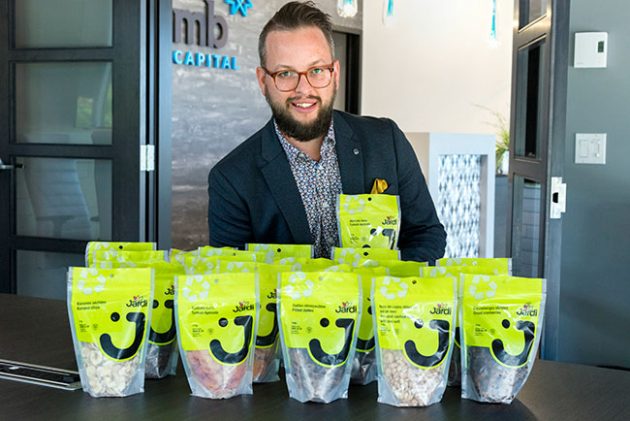
Jardi Foods general manager Maxime Busseau proudly displays high-quality nut mixes and dry fruit products packaged inside new fully-recyclable stand-up pouches.
All in all, Jardi Food sources an estimated 300 different types of product from across North America and around the world to maintain a highly diverse product portfolio comprising well over 600 SKUs (stock keeping units).
“Our business has been growing by about 10 to 12 per cent a year since MD Capital purchased Jardi,” Busseau told Canadian Packaging in a recent interview, citing MB Capital’s keen focus on maintaining that growth momentum well into the future through “proactive ongoing investment” in new production, marketing and packaging capabilities.
A major part of those investments has been tied to moving Jardi into a brand new 24,000-square-foot facility in 2015, according to Busseau, followed by a year of bringing all of the plant’s operations and equipment up to levels required for achieving the coveted SQF, Level 2, food safety management standard certification of the Safe Quality Food Institute.
“Our new plant got a 98-percent score during our recent SQF audit,” Busseau states, crediting the certification for enabling the company to line up important new retail customers such as Dollarama and Costco retail chains.
Already a long-time supplier to the Quebec-based IGA, Metro and Provigo grocery outlets, Jardi is currently exploring ways to boost its private-label business with its retail customers, according to Busseau, to complement the promising growth of the company’s own flagship Jardi retail brand.
“We went through all the careful steps to ensure that our new facility would have sufficient extra capacity and space to accommodate our future growth demands,” Busseau states.
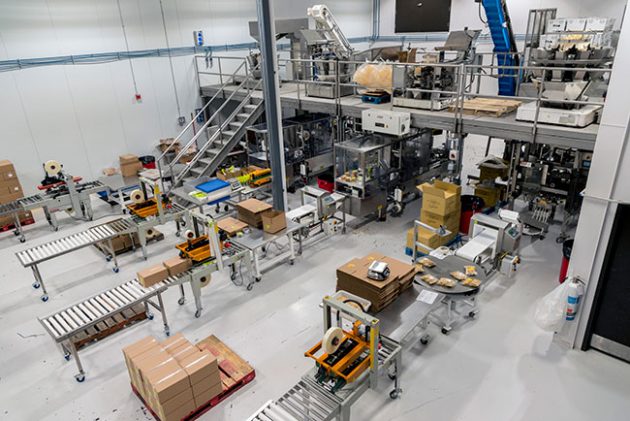
Jardi Foods’ busy 24,000-square-foot production facility in Sherbrooke houses five production lines to package of broad assortment of dry bulk products into retail packages shipped to leading grocery operators in Quebec and eastern Canada.
Currently employing 80 full-time people over a two-shift, five-days-a-week schedule, along with a nightly cleaning/sanitation shift, the Jardi plant houses five high-performance, automated packaging lines to pack its varied products inside three primary packaging formats that include pillow bags, translucent rigid plastic bowls with snap-on closures, and flexible stand-up pouches.
“We are definitely keen on using packaging automation to maintain high productivity levels,” states Busseau, citing an impressive list of recently installed critical production machinery such as Ishida automatic multihead scales; high-sensitivity S+S metal detectors
installed on each packaging line; and high-speed Hayssen bagging and vertical form-fill-seal (VFFS) machinery, among others.
While the operation still relies on manual labor to load the finished packaged inside corrugated cases and to assemble them on the shipping pallets, “We are definitely open to the idea of automating our secondary packaging operations once we get the volumes to justify the investment,” Busseau states.
That may happen sooner rather than later in light of the marketplace success and acclaim of the company’s new line of Jardi brand fruit-and-nut mixes packaged in eco-friendly, fully-recyclable plastic stand-up pouches developed by the Montreal-headquartered TC Transcontinental Packaging.
“It was actually an article in Canadian Packaging that convinced me to approach Transcontinental to see if they could provide me with a sustainable packaging solution that our retail customers are increasingly demanding from all their suppliers,” Busseau relates.
“It was a story about a compostable peanut bag that was used to package single-serve peanut portions at baseball parks,” he recounts, “and I thought it was a great idea that could also work for our nut products.”
After initial consultations with Transcontinental, however, Busseau realized that a compostable solution would not be practical for Jardi for the time-being, primarily because of a shortage of adequate industrial composting facilities located nearby.
Instead, TC Transcontinental presented Jardi with another highly sustainable packaging option in the form of fully-recyclable, multi-barrier flexible stand-up pouches with resealable PCT (press-to-close) closures and outstanding shelf-life properties.
“We are proud and delighted to be the first food company in Canada to use this innovative sustainable packaging format,” say Busseau, noting that the sturdy, puncture-resistant pouch is already used to package about 65 different Jardi brand SKUs at the plant.
“This pouch performs very well on our stand-up pouching line that runs between 20 and 24 pouches per minute, depending on the product, and our retail customers are really happy bout being able to offer consumers a viable sustainable packaging option.”
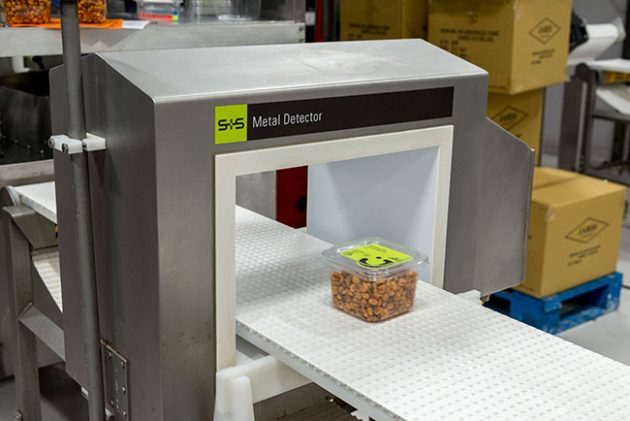
Each of the five packaging line at the Jardi Foods production facility in Sherbrooke, Que. features a high-accuracy S+S metal section system at the end of line to check each fished packages for any signs of product contamination to ensure optimal quality control and product safety.
In fact, the pouches’ impressive environmental attributes enabled the Jardi brand to pick up the Silver Medal award in the Sustainable Package category of the PAC Canadian Leadership Awards national packaging competition earlier this year—an honor that Busseau calls a “thrilling” accomplishment.
“For a relatively small company like ours, sharing the stage with so many big global brands was a very special milestone for us in the company’s history,” Busseau extols, while lavishing praise on all the hard work behind the scenes performed by Transcontinental Packaging to make it happen.
“They have proven to be an exceptionally helpful and service-focused partner with extraordinary knowledge and understanding of packaging sustainability,” Busseau proclaims, “while also taking care of all the product protection and shelf-liferequirements.”
Produced by Transcontinental’s TC Flexstar Packaging subsidiary in Richmond, B.C., the custom-developed pouches are formed on a Totani pouchmaking machine from a PE (polyethylene) multilayer film incorporating an EVOH (ethylene vinyl alcohol) barrier for optimal oxygen resistance.
According to TC Transcontinental Packaging’s business development account manager Roberto Travaligni, “Until this development, a multilayer PE/EVOH flexible packaging barrier film was not currently commercialized for a food product anywhere in Canada.
“Until now, such as structure could not have been recycled because of the durability of the polymers involved and the incompatibility of the polymers in the structure,” Travaligni adds.
To overcome this limitation, Transcontinental worked closely with renowned industry partners Dow Chemical Company and Charter NEX Films to incorporate Dow’s proprietary RETIN resin technology into the film in way that would make the EVOH barrier compatible with existing recycling streams.
“Blending art, science and technology, we were able to develop one of the first commercialized package for food that hits all the notes: 100-percent recyclingready, EVOH barrier for product preservation, superior seal strength, and optimal durability,” Travaligni states.
Says Travaligni: “Our collaboration was the perfect match for our commitment to sustainability and innovation that runs deep throughout our organization, both in our operations and our partnerships.
“This multilayer recyclable pouch with barrier brings an innovative new sustainable product to the industry, while still protecting the flavor and the freshness of the products,” Travaligni states.
“All suppliers have sustainability commitments and at this point in time,” Travaligni points out, “and this breakthrough technology can open doors for a lot more food packaging applications that require barrier properties for freshness and to be recyclable now.”
Having secured the authoritative third-party eco-certification from the Sustainable Packaging Coalition (SPC), the sturdy bags can be recycled in all Canadian municipalities that accept the HDPE #2 type plastics, meaning that all components in the package are recyclable once product has been evacuated.
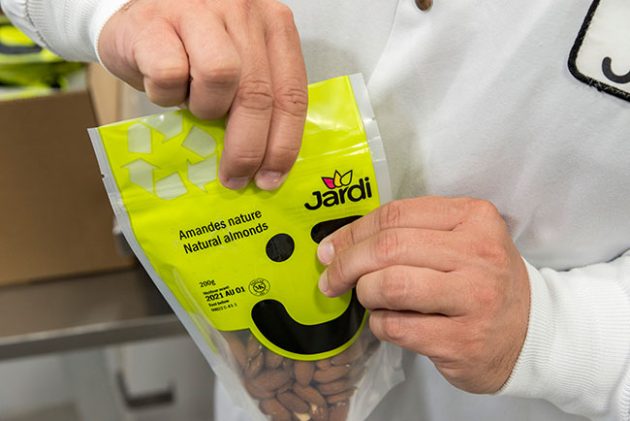
Maxime Busseau displays the built-in consumer convenience incorporated into the package design in the form of a sturdy PTC (press to close) resealable closure applied to the pouches inline during the actual pouch making process at the TC Flexstar Packaging facility in Richmond, B.C.
“By promoting and supporting innovation in flexible packaging, we encourage more businesses to develop better eco-responsible solutions,” says Travaligni, crediting Jardi Foods for its enthusiasm in bringing this new flexible packaging innovation to market with such award-winning aplomb.
Not surprisingly, Busseau is happy to confirm his fondness for the new stand-up package, decorated with a splash of sunny-yellow dropback and a cleverly designed brand logo stylized into a ‘smiley face’ letter J graphic that was created by local graphic designers Bingo Design.
The top left tear-off corner of the package also boasts the easily recognizable arrowed triangle recycling symbol to reinforce the brand’s sustainability credentials and to sway consumers to make an environmental choice right at the shelf level.
With the clear bottom half of the front panel allowing consumers to have a thorough look of the product inside that package, “This package is as transparent as it is sustainable, Busseau notes.
“We intentionally wanted to keep the graphics simple but also playful,” Busseau says, “the reinforce the ‘treat’ factor of our products.
“It’s supposed to be a fun product that people can enjoy without having to feel guilty a out it,” he says, and he environmental message of our packaging is a key part of that appeal.
“It is an inherently sustainable design in many other ways as well, he adds.
“It is lightweight, allowing for reduction in fuel use for transportation; it preserves product freshness to mitigate food waste; and it can be reused for refills for other products or for storing small items,” he notes.
“Also, it is important that this still performs exceptionally well on the filling equipment, so that production and machinability are optimized, and has exceptional seal strength,” says Busseau, noting the new pouches provide the products inside with six- to nine-month shelf-life, depending on the product, and up to a full year for snacks with minimal moisture content.
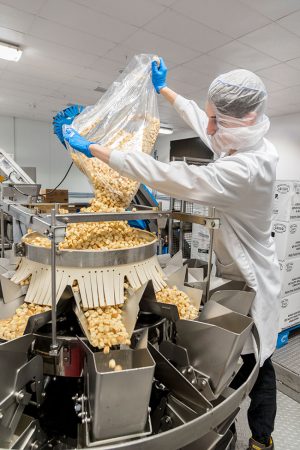
A Jardi Foods plant employee unloading bulk product into the hopper of the automatic multihead scaling system that measures and dispenses the pre-measured quantities of product down to the filling machinery on the plant floor below.
According to Busseau, the success of the new stand-up pouch has already prompted him to look for similar eco-friendly packaging options to replace the nonrecyclable plastic pillow bags the company runs on two its five lines for candy treats and other products.
“Now that we know what’s available out there in terms of technology and feasibility, we can feel confident about moving forward and making all of our packaging more recyclable for the benefit of our customers, the consumers and the environment,” he states.
“All our plastic bowls and caps are already made from fully-recyclable PET (polyethylene terephthlate),” he explains, “so after having done this conversion to recyclable stand-up pouched from Transcontinental, we are eager to make all our product packaging truly sustainable.
“And while we will consider all the options available in the market for doing so,” he concludes, “I am looking forward to see what the good folk at Transcontinental can come up for us to make it happen.”
– Photos by Pierre Longtin
Advertisement

